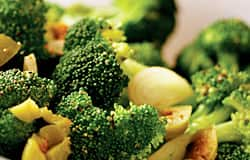- Science & Research
- Science News
- Newsletter
- 2011
- September 30

Newsletter
Newsletter
Fruit Vegetables May Target Cancer In Parts Of The Colon
Fruit and vegetables may target cancer in different parts of the colon
Friday September 30, 2011. In the October, 2011 issue of the Journal of the American Dietetic Association, Australian researchers report the outcome of a study which suggests site-specific protective effects of various fruits and vegetables against the risk of colorectal cancer. The finding may help explain inconsistent results from other studies which sought to examine the effects of plant foods against the disease. Lin Fritschi, PhD and colleagues at the University of Western Australia compared 918 colorectal cancer patients to 1,021 controls who had no history of the disease. Questionnaires completed by the participants were analyzed for the frequency of consumption of 38 different vegetables and fruits. Total fruit, vegetable, or fruit and vegetable intake were not associated with the risk of proximal colon cancer or rectal cancer, however, the researchers found a protective effect for increased intake of brassica vegetables, including broccoli, cauliflower, cabbage and Brussels sprouts, against cancer of the proximal colon. Total fruit and vegetable intake, total vegetable intake, and the consumption of dark yellow vegetables and apples were associated with a reduction in distal colon cancer risk. While apple consumption was protective against rectal cancer, consuming a high amount of fruit juice was associated with a greater risk of the disease. The authors note that "Fruit juice may have similar composition to fruit with respect to a range of phytochemicals, but it is low in fiber and some fruit juices contain added sugar. In addition, there is some evidence to suggest that foods containing high amounts of sugars may increase risk of colorectal cancer, and animal studies have shown that glucose and fructose are associated with increased colonic proliferation and aberrant crypt foci." "Fruits and vegetables have been examined extensively in nutritional research in relation to colorectal cancer, however, their protective effect has been subject to debate, possibly because of different effects on different subsites of the large bowel," noted Professor Fritschi, who is the head of the Epidemiology Group at the Western Australian Institute for Medical Research. "It may be that some of the confusion about the relationship between diet and cancer risk is due to the fact that previous studies did not take site of the colorectal cancer into account. The replication of these findings in large prospective studies may help determine whether a higher intake of vegetables is a means for reducing the risk of distal colorectal cancer." | ||||||||||||||||
 | ||||||||||||||||
| ||||||||||||||||
| ||||||||||||||||
 | ||||||||||||||||
| ||||||||||||||||
 | ||||||||||||||||
The latest news on aging, nutrition, and vitamins
Lab
Testing
How Life Extension lab testing works










